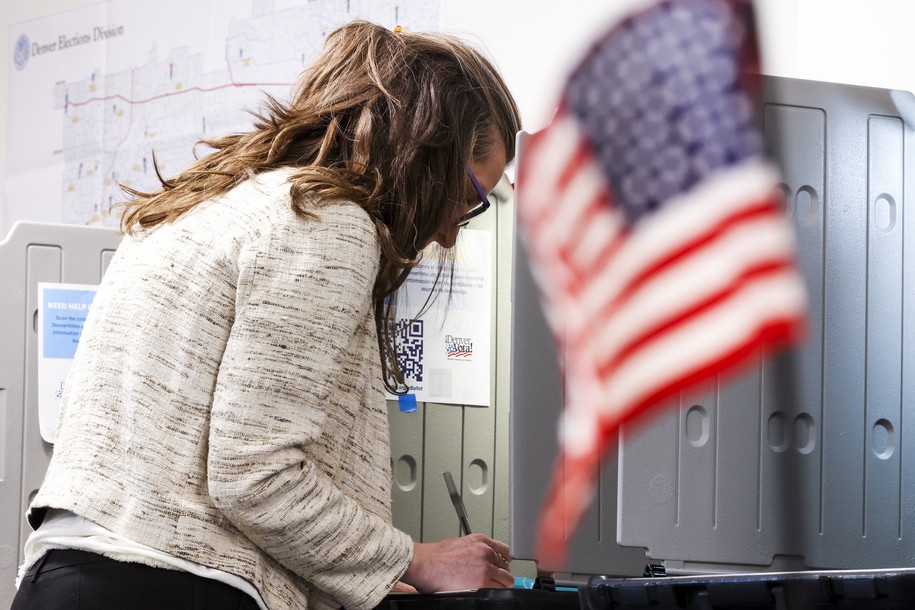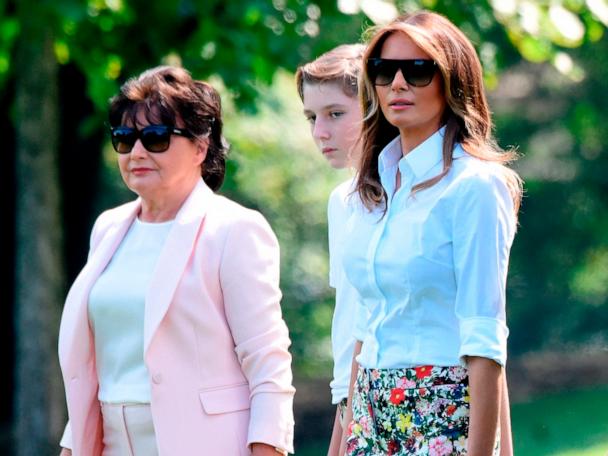Originally published by The 19th
In news shared exclusively with The 19th, GIFFORDS, the gun safety advocacy organization founded by former Arizona Congresswoman Gabrielle Giffords, has named veteran campaign manager Emma Brown as its new executive director. The group recently marked its 10-year anniversary, and as the 2024 races shape up it is looking to connect with purple- and red-state voters around gun safety and gun violence prevention.
Giffords describes Brown, 30, as “an old soul,” telling The 19th, “I have had the opportunity to see her leadership and innovation up close, and I know she is the perfect person to help me lead GIFFORDS into its next era.”
Brown said Trump securing the Republican presidential nomination in 2016 led her into politics. “I realized we were at an inflection point, one of those moments when time sort of slows down and zooms out. I asked myself, when I tell my kids about all of this someday, am I going to be able to look them in the eye and tell them that I did everything I could when our country was on a precipice.”
It’s the same question she said now guides her in turning her focus to gun violence prevention work, and something she sees as closely tied to the foundational work Giffords has already achieved since the day she was shot in a grocery store parking lot in Arizona during a constituent event in January 2011.
“Gabby inspires people. Her courage and her resolve — people react to her in a way that’s really unlike anything I’ve ever seen,” Brown said. From her work on hard-won campaigns, she understood the inherent power that Giffords’ own personal work and that of the organization she founded has in consensus-building.
A seasoned campaign strategist, Brown most recently ran the high-stakes re-election campaign in Arizona for Giffords’ husband, Sen. Mark Kelly, and oversaw the Biden campaign’s work in the state in 2020. Previously, she managed congressional campaigns for Betsy Dirksen Londgrian in Illinois and Lindsay Davis Stover in Virginia, as well as Wendy Gooditis’ campaign for the Virginia House of Delegates. She also worked on Secretary of State Hillary Clinton’s presidential campaign in Ohio in 2016.
“I think for all of the partisanship and division in our culture right now, what I really found is that most folks want the same thing: They want to work hard and put food on the table, and they want their families to be safe and healthy,” Brown said. “They are scared for their kids and their churches and their synagogues and to even go to the grocery store.”
It’s why Brown sees the work ahead of her at GIFFORDS as not polarizing or impossible, but as a tremendous opportunity to rally a diverse set of voters around common goals.
Brown pointed to the 90 percent of Americans who support universal background checks — including 70 percent of all National Rifle Association (NRA) members, and 83 percent of Republicans. “People will have you believe that this issue is just too hard, that we are in too deep and that it’s too controversial — but we know that is just not true,” she said. This is why Brown said the need for coalition-building is not only critical, but the key to delivering policy-oriented solutions from grassroots community work on up.
One crucial group Brown wants to rally is women, because the stakes for them around gun violence have only risen since the Supreme Court’s 2022 ruling in Dobbs v. Jackson Women’s Health Organization overturned Roe v. Wade and ended the constitutional right to abortion access. Nearly 20 percent of American women will experience some form of domestic violence during pregnancy, and homicide is the leading cause of death for Americans who are pregnant or have given birth in the last year. Per the most recent data, 81 percent of these deaths involve firearms. Calls to the National Domestic Violence Hotline reporting reproductive coercion — a form of domestic violence — doubled in the first year following the Dobbs ruling, and women’s health providers are already facing more barriers to providing domestic violence intervention for patients as more restrictions on abortion care have gone into effect nationwide. In a country where domestic violence, gun violence and reproductive rights are so intrinsically linked, a reality of the Dobbs ruling is more firearm deaths for pregnant people.
“We’re having a basic conversation about how much this country prioritizes the safety and the lives of women, and I think if you look at the [election] results from 2022, it’s crystal clear from an electoral standpoint that American women are tired of their lives and their agency and their safety and their well-being coming in last,” she said.
Brown said the risks amplified by the overturning of Roe v. Wade — and those posed by United States v. Rahimi, a firearms possession case currently before the Supreme Court — make gun safety legislation all the more crucial for women.
Mass shootings have put red flag laws in the public eye, as has the Rahimi case, which challenges a federal law that bars gun ownership to those who are currently under a domestic violence restraining order. During the Rahimi case, the NRA filed an amicus brief arguing that domestic violence restraining orders are inherently unconstitutional.
American women are “a powerful, powerful voting bloc, as we’ve seen affirmed again and again,” Brown said. But American women, she added, “are 21 times more likely to be killed by a gun than women in other high-income countries.”
Articulating this matters, said Brown, as does helping women connect this to an already innate feeling many are already having about how their lives are now very much on the line. “After Roe was overturned, we saw a massive surge of women voters really, really upset about the fact that their rights and their choices and their bodies ranked last. This year, the Supreme Court has an important opportunity to prioritize the lives of women over the rights of domestic abusers, as we’ve seen in the huge outpouring of support against the Rahimi case.”
Brown pointed to a recent study done in California that found that the state’s red flag law had prevented 58 potential mass shootings over the course of the one year that the study had been conducted. Over two-thirds of all mass shootings have been tied to an initial act of domestic violence, frequently using firearms. The passage of red flag laws to disarm those potentially dangerous to themselves or others has also become a key tool for domestic violence prevention, Brown said. “Women voters are really paying attention and keeping track of who had their back in this and who doesn’t.”
As she starts her tenure as executive director at GIFFORDS, Brown is also focused on a new state-based strategy for the organization, with initial on-the-ground efforts to be launched in Florida and Texas. Gun violence and crime are among the top issues for Latino voters, surpassing immigration and border issues. The organization’s research has also found that these voters want to see action from their lawmakers on this issue, and immediately. Brown calls Texas and Florida standout places for the organization to focus and sharpen their work, places that are “critical and underdeveloped” in their potential for reaching — and flipping — voters. “Neither of them are ever going to be safe states where people are not worried about gun violence tomorrow,” Brown said. “We need to be able to show progress and momentum in places that are tough political landscapes, where we aren’t going to win every time, but where we can put together a program and a road map to make those states safer, which is more important than anything.”
Thinking in this way also means investing in community violence intervention at the most basic level, Brown said, pointing to the work of her colleague at GIFFORDS, Paul Carillo. He leads the group’s strategy in this area, focusing on “the kinds of daily gun violence that doesn’t always make the headlines, but it’s disproportionately and devastatingly impacting Latino communities.” Research conducted by GIFFORDS found that between 2014 and 2020, the number of Hispanic people who died via gun violence increased by 66 percent, double the rate of gun deaths nationwide. Gun homicides have been the second leading cause of death for Hispanic men between the ages of 15 and 34 in America for over 20 years now. Organizations like the one Brown is now helming have an obligation, she said, to ensure that local leaders and groups on the ground that are already positioned within communities are best equipped to stop cycles of violence.
It also must be the group’s mission, she said, to communicate with Latino voters about gun violence prevention “competently and consistently and early.” Brown said GIFFORDS plans to show up regularly and routinely within communities to hear their concerns and offer practical tools for support. “We cannot show up with Latino voters two months before the election and start talking about this and expect it to have some sort of magic mobilizing. This is a longer-term, more permanent program.”
The group’s goal, she said, was “to be able to pass laws in the states that are going to save lives — particularly the lives of Black and Brown folks who are being disproportionately impacted.”
The next step, culturally, says Brown, is to create a coalition of voters previously written off as unreachable — be it Spanish-speaking people in historically red states, gun owners or conservative White women.
Adrian Saenz, a member of the board at GIFFORDS, said that this outlook of Brown’s is exactly why she was hired for the job. “She has led and won very big campaigns across the country — including during the Trump era — in tough states like Arizona, states that only got tougher during that period.” In Brown, Saenz said, the board saw a “transformational opportunity “to build a wider coalition, a bigger tent — a thinking that if we’re going to actually save lives, we have to be in red and purple states. She comes from and has thrived in those environments.”
And Brown is confident that this work is absolutely possible. “This is not a political issue anymore,” she said. “It used to be a partisan, political issue that people were afraid to touch and that is not the case — in our elections or in our culture or in our conversations — anymore.” She points to the way that President Joe Biden has made talking about gun safety a cornerstone of his reelection strategy, something she said would have been “unimaginable” 10 years ago when GIFFORDS was first founded.
Giffords emphasized that the organization she founded has had a notable track record over the last decade, work that has primed the ground for what Brown is poised to do next. “Over the last 10 years we’ve built an organization that passed more than 620 gun safety laws in states across the country, enacted the first federal gun safety legislation in nearly 30 years, and countered the gun lobby,” the former congresswoman said. “I’m excited to have Emma aboard for this new chapter.”



